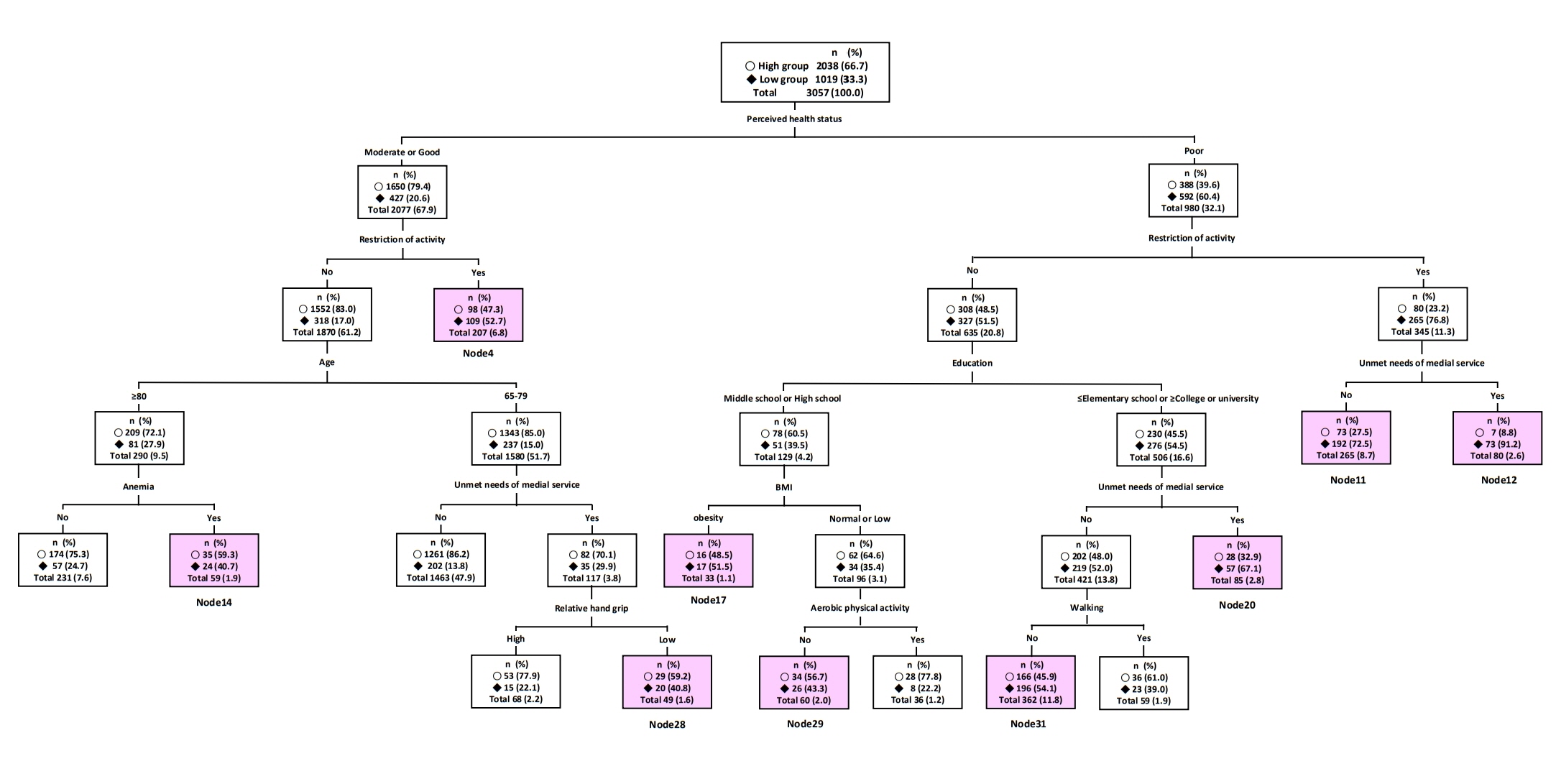2. Park S, Nam JY. Association between changes in multiple chronic conditions and health expenditures among elderly in South Korea: Korean longitudinal study of aging 2014-2018. Health Policy and Management. 2022;3(3):282-292.
https://doi.org/10.4332/KJHPA.2022.32.3.282

3. Lee YK, Kim SJ, Hwang NH, Lim JM, Ju BH, Namgoung EH, et al. Survey on the elderly in 2020. Final report. Seoul: Korea Institute for Health and Social Affairs; 2020 Nov. Report No.:11-1352000-000672-12.
8. Moon H, Cha S. Multilevel analysis of factors affecting health-related quality of life of the elderly. Journal of Korean Academy of Psychiatric and Mental Health Nursing. 2022;31(3):391-401.
https://doi.org/10.12934/jkpmhn.2022.31.3.391

10. Kim JH, Park S. A path analysis for health-related quality of life in long-term care insurance in-home service users. Research in Community and Public Health Nursing. 2023;34(1):1-11.
https://doi.org/10.12799/rcphn.2022.00283

11. Choi HY, Lee G. Factors influencing health-related quality of life in the Korean seniors with lower education level: focusing on physical activity types. Korean Journal of Adult Nursing. 2020;32(3):292-304.
https://doi.org/10.7475/kjan.2020.32.3.292

12. Zheng E, Xu J, Xu J, Zeng X, Tan WJ, Li J, et al. Health-related quality of life and its influencing factors for elderly patients with hypertension: evidence from Heilongjiang province, China. Frontiers in Public Health. 2021;16(9):654822.
https://doi.org/10.3389/fpubh.2021.654822

14. Poursadeqiyna M, Arefi MF, Pouya AB, Jafari M. Quality of life in health Iranian elderly population approach in health promotion: a systematic review. Journal of Education and Health Promotion. 2021;10:1-9.


17. Ko H, Park YH, Cho B, Lim KC, Chang SJ, Yi YM, et al. Gender differences in health status, quality of life, and community service needs of older adults living alone. Archives of Gerontology and Geriatrics. 2019;83:239-245.
https://doi.org/10.1016/j.archger.2019.05.009


21. Kwon MG, Park MK, Kim HJ, Kim JI, Kim SA. Factors influencing the muscle strength of the elderly without activity restrictions by gender. Journal of Korean Gerontological Nursing. 2021;23(1):43-53.
https://doi.org/10.17079/jkgn.2021.23.1.43

23. Curran E, Rosato M, Ferry FR, Leavey G. Prevalence and factors associated with anxiety and depression in older adults: gender differences in psychosocial indicators. Journal of Affective Disorders. 2020;267:114-122.
https://doi.org/10.1016/j.jad.2020.02.018


24. Huh MI. SPSS statistics classification analysis. Seoul: Data Solution; 2012. p. 107-175.
25. Kim HS, Jeong SH. Identification of subgroups with poor glycemic control among patients with type 2 diabetes mellitus: based on the Korean National Health and Nutrition Examination Survey from KNHANES VII (2016 to 2018). Journal of Korean Biological Nursing Science. 2021;23(1):31-42.
https://doi.org/10.7586/jkbns.2021.23.1.31

30. Korea Disease Control and Prevention Agency. Korea National Health & Nutrition Examination Survey. Data Analysis guidline [Internet]. Osong: Korea National Health & Nutrition Examination Survey; 2023 [cited 2023 Dec 12]. Available from:
https://knhanes.kdca.go.kr/knhanes/sub03/sub03_06_02.do
32. Jo HH, Seo YH. Effects of equipment pilates reformer exercise on changes in body composition and abdominal muscle strength in adult women. The Korean Journal of Growth and Development. 2023;31(1):25-29.
http://doi.org/10.34284/KJGD.2023.02.31.1.25

33. Kang JC, Lee CH. The effect of older adults' regular physical activity on mental health. The Korean Journal of Physical Education. 2000;39(4):209-216.
34. Kim MJ, Yoo JI. The relationships between physical activity participation, exercise identity, and mental health among university students. The Korean Journal of Physical Education. 2017;56(3):57-68.
http://doi.org/10.23949/kjpe.2017.05.56.3.6

35. So WY, Hhong JY, Jun EJ, Choi DH, Kim KH. Effects of aquarobics exercise on body composition, fitness and health related quality of life (SF-36) in elderly women. Journal of the Korean Gerontological Society. 2010;30(3):683-694.
37. Yeun YR. Resistance training on muscle strength among community-dwelling older adults: a systematic review and meta-analysis. Journal of the Korea Society of Computer and Information. 2018;23(3):71-77.
https://doi.org/10.9708/jksci.2018.23.03.071

39. Jeon HS, Kahng SK. Age differences in the predictors of medical service use between young-old and old-old: implications for medical service in aging society. Health and Social Welfare Review. 2012;32(1):28-57.
https://doi.org/10.15709/hswr.2012.32.1.28

40. Sung HY, Lee SK, Na JH. A study on factors associated with suicidal ideation of older people: focused on the group comparisons by objective and subjective health status. Korean Journal of Social Welfare Research. 2021;69:117-143.
https://doi.org/10.17997/SWRY.69.1.5

41. Sim HI, Hong SI. Moderating effect of social ties on the relationships between elder abuse, depression, and suicidal ideation. Korean Criminal Psychology Review. 2019;15(4):37-54.
https://doi.org/10.25277/KCPR.2019.15.4.37

43. World Health Organization. Guidance note on integrating health equity, gender equality, disability inclusion and human rights in WHO evaluations [Internet]. Geneva: WHO Evaluation Office; 2023 [cited 2023 Oct 20] Available from:
https://bit.ly/403GTbS








 PDF Links
PDF Links PubReader
PubReader ePub Link
ePub Link Full text via DOI
Full text via DOI Download Citation
Download Citation Print
Print


